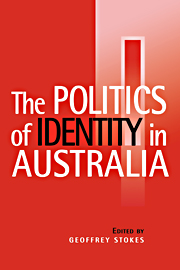Book contents
- Frontmatter
- Contents
- Acknowledgements
- Contributors
- Introduction
- Theorising Identity
- Gender and Sexuality
- 4 ‘Manly, True and White’: Masculine Identity and Australian Socialism
- 5 ‘Stirring Tales’: Australian Feminism and National Identity, 1900–40
- 6 The Making of an Australian Civic Identity: The Bodies of Men and the Memory of War
- 7 (Homo) sexual Identities, Queer Theory and Politics
- Race, Place and Citizenship
- Culture: Literature and Film
- References
- Index
7 - (Homo) sexual Identities, Queer Theory and Politics
Published online by Cambridge University Press: 05 June 2012
- Frontmatter
- Contents
- Acknowledgements
- Contributors
- Introduction
- Theorising Identity
- Gender and Sexuality
- 4 ‘Manly, True and White’: Masculine Identity and Australian Socialism
- 5 ‘Stirring Tales’: Australian Feminism and National Identity, 1900–40
- 6 The Making of an Australian Civic Identity: The Bodies of Men and the Memory of War
- 7 (Homo) sexual Identities, Queer Theory and Politics
- Race, Place and Citizenship
- Culture: Literature and Film
- References
- Index
Summary
It is tempting to wish that identity politics would go away. Faced with the human misery which results from the violent assertion of racial, ethnic and religious differences in Bosnia, South Africa and India, the liberal Enlightenment appeal to a transcultural humanness, whereby we are all seen as individuals equal before the law, can only be an improvement. Yet the post-Cold War world has reminded us of the stubborn persistence of national and ethnic identities as a basic fact of political life and source of political conflict. Such identities are of course social constructions: one is not born Azerbaijani or Afrikaaner, these are identities which are historically determined, socially reproduced and changeable through political action. Nonetheless, such identities remain central to most of political life, and we know very little about the conditions under which people would willingly surrender a strong sense of identity based on race or belief. Indeed, some ethnic ties appear so persistent that an argument for an instinctual human need for communal (tribal) identity becomes seductive.
Two points should be made in relation to current postmodern critiques of ‘identity polities’. First, it is perfectly reasonable to recognise that identities are socially constructed while also acknowledging their apparent resilience as political forms. Postmodernists tend to assume that ‘identity politics’ are a form of essentialism (see e.g. Fuss 1989). But this sort of essentialism has been out of fashion in the social sciences for far longer than the new literary imperialists, who believe they invented both cultural studies and social theory, recognise.
- Type
- Chapter
- Information
- The Politics of Identity in Australia , pp. 105 - 114Publisher: Cambridge University PressPrint publication year: 1997
- 1
- Cited by

